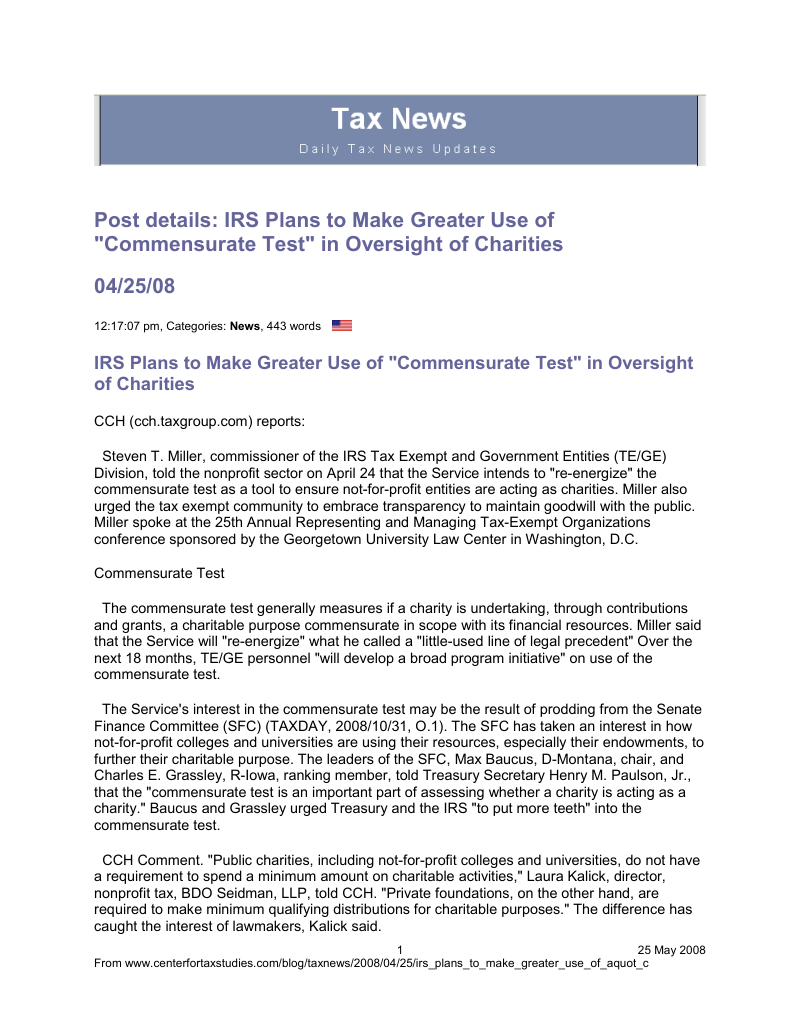Tax News reports on how Steven Miller, the commissioner of the tax-exempt and government-entities division of the IRS, would ensure NPOs are acting as charities.
- Type
- News (traditional)
- Source
- George L. Yaksick, Jr. Non-LDS
- Hearsay
- DirectJournalism
- Reference
George L. Yaksick, Jr., "Post details: IRS Plans to Make Greater Use of 'Commensurate Test' in Oversight of Charities," Tax News, April 25, 2008, accessed September 26, 2023
- Scribe/Publisher
- Tax News
- People
- George L. Yaksick, Jr.
- Audience
- Reading Public
- Transcription
Steven T. Miller, commissioner of the IRS Tax Exempt and Government Entities (TE/GE) Division, told the nonprofit sector on April 24 that the Service intends to "re-energize" the commensurate test as a tool to ensure not-for-profit entities are acting as charities. Miller also urged the tax exempt community to embrace transparency to maintain goodwill with the public.
Miller spoke at the 25th Annual Representing and Managing Tax-Exempt Organizations conference sponsored by the Georgetown University Law Center in Washington, D.C.
Commensurate Test
The commensurate test generally measures if a charity is undertaking, through contributions and grants, a charitable purpose commensurate in scope with its financial resources. Miller said that the Service will "re-energize" what he called a "little-used line of legal precedent" Over the next 18 months, TE/GE personnel "will develop a broad program initiative" on use of the commensurate test.
The Service's interest in the commensurate test may be the result of prodding from the Senate Finance Committee (SFC) (TAXDAY, 2008/10/31, O.1). The SFC has taken an interest in how not-for-profit colleges and universities are using their resources, especially their endowments, to further their charitable purpose. The leaders of the SFC, Max Baucus, D-Montana, chair, and Charles E. Grassley, R-Iowa, ranking member, told Treasury Secretary Henry M. Paulson, Jr., that the "commensurate test is an important part of assessing whether a charity is acting as a charity." Baucus and Grassley urged Treasury and the IRS "to put more teeth" into the commensurate test.
CCH Comment. "Public charities, including not-for-profit colleges and universities, do not have a requirement to spend a minimum amount on charitable activities," Laura Kalick, director, nonprofit tax, BDO Seidman, LLP, told CCH. "Private foundations, on the other hand, are required to make minimum qualifying distributions for charitable purposes." The difference has caught the interest of lawmakers, Kalick said.
Transparency
Charities must embrace transparency, Miller urged, so the public can see that their contributions are being put to good use. The public expects the IRS to act "when a charity is using just two cents of every dollar on services." Enforcement in the exempt sector is very private, Miller acknowledged. Code Sec. 6103 protects the confidentiality of returns and return information except as otherwise authorized.
"Your willingness to share information with us is often predicated on the fact that it is not going out into the public domain." However, the requirements of Code Sec. 6103 can create an "imbalance" in the public's perception of IRS enforcement. "In most cases, our enforcement and final resolution is not public. This leads to all sorts of misconceptions of what we are up to."
- Citations in Mormonr Qnas
The B. H. Roberts Foundation is not owned by, operated by, or affiliated with the Church of Jesus Christ of Latter-day Saints.

